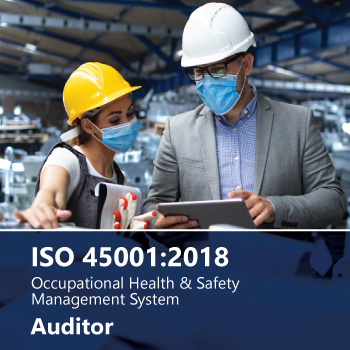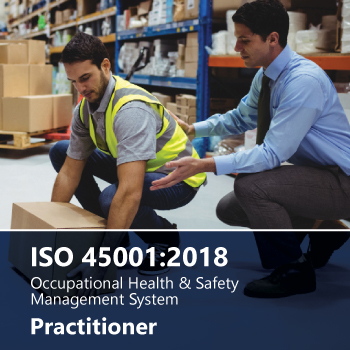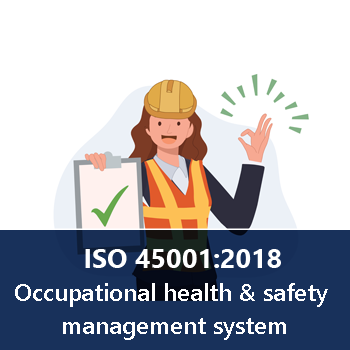Thinking about a career in occupational health & safety auditing? Here’s what you should know
Published on June 04, 2024

If you are considering a career as occupational health and safety auditors, then you should read this...
As businesses worldwide increasingly prioritize the health and safety of their workforce, the demand for skilled professionals in occupational health and safety (OHS) management auditing continues to rise. If you are contemplating a career in this field, particularly with a focus on ISO 45001, there are several key aspects you should consider to understand the landscape and the opportunities it presents.
What is ISO 45001?
ISO 45001 is an international standard for occupational health and safety management systems (OHSMS). Published by the International Organization for Standardization (ISO), it provides a framework for organizations to improve employee safety, to eliminate hazards and reduce health and safety risks, to create better and safer working conditions.
The role of an occupational health and safety auditor
An OHS auditor is responsible for evaluating (by auditing) an organization's compliance with the requirements of standards, such as ISO 45001. This role involves:
- Conducting audits. Performing on-site audits to evaluate compliance to the requirements of the standard. This includes reviewing documentation, observing workplace activities and practices, interviewing workers and managers.
- Understanding workplace hazards and risks. An auditor should be experienced enough to understand the hazards associated with an organization’s operations and context and to determine if the controls put in place are effective enough the OHS risks.
- Adding value. An audit should offer value to the organization and it should help in the effort for continual improvement. The findings of the audit should provide an accurate picture of the situation with the identification of areas that require improvements
Skills and qualifications Nneeded
To thrive as an OHS auditor, you need a blend of technical knowledge, analytical skills, experience and interpersonal abilities. Here are some key qualifications and skills:
Educational background
- Studies in a technical area and work experience in an industrial setting where significant occupational health and safety hazards are present is obviously an important advantage for an auditor.
- Excellent knowledge of the requirements for an occupational health and safety management system according to ISO 45001 is a key aspect. A certification as OHS management system auditor will serve as evidence of your knowledge of the subject matter.
Technical skills
- Knowledge of ISO 45001. A thorough understanding of ISO 45001 and knowledge about related standards such as ISO 45002, ISO 45003 or ISO 45004. Find a course that will not cost you a fortune and from where you can get valuable information. You can try our Udemy course, for example.
- Risk assessment. Proficiency in conducting risk assessments using different methodologies and good knowledge of the process for hazard identification.
- Audit techniques. Familiarity with audit tools and techniques, including collecting evidence or conducting interviews.
Soft skills
- Attention to detail. The ability to spot potential issues and nonconformities during audits.
- Analytical thinking. Strong problem-solving skills to analyze the audit findings and to make proper recommendations.
- Communication. Excellent verbal and written communication skills to obtain the necessary information through interviews, to engage with stakeholders and to effectively report the audit results.
The benefits of a career in OHS auditing
Choosing a career in OHS auditing offers several benefits:
- High demand. With increasing global awareness of workplace safety, the demand for qualified OHS auditors is robust and growing.
- Diverse opportunities. Opportunities exist across various industries, from manufacturing and construction to healthcare and services.
- Impactful work. Your work directly contributes to safer working environments, protecting employees from harm and enhancing organizational efficiency.
- Professional growth. Continuous learning opportunities are plentiful allowing for ongoing professional development.
Challenges to consider
While a career in OHS auditing is rewarding, it also comes with challenges:
- Changes. Staying up to date with the latest regulations and with the revisions of relevant standards can be demanding, but it is absolutely critical for an auditor.
- Complex environments. Working in complex industrial settings can pose unique challenges, requiring adaptability and resilience.
- Stakeholder management. Balancing the needs and expectations of various stakeholders (e.g. auditees, audit clients, certification bodies and other auditors) can be challenging, requiring strong negotiation and conflict-resolution skills.
Steps to start your career
- Education. Get adequate training to familiarize yourself with the requirements of ISO 45001.
- Certification. Pursue a certification as ISO 45001 OHS Auditor.
- Experience. Gain practical experience by participating in audits as auditor in training, learn from experienced assessors and to become familiar with the audit process.
- Networking. Join professional organizations, attend industry conferences, and connect with experienced auditors to build your network.
Conclusion
A career in occupational health and safety auditing, especially with a focus on ISO 45001, is both challenging and rewarding. It offers the opportunity to make a significant impact on workplace safety and employee well-being. By developing the necessary skills and qualifications, and staying committed to continuous learning and improvement, you can thrive in this vital and growing field. If you have a passion for safety and a keen eye for detail, this career path might be the perfect fit for you.


